As we celebrate the 53rd anniversary of the premiere of Star Trek on September 8, 1966, let’s take a trip back in time five decades to what was very likely the first-ever Star Trek fan film to be shut down by the studio that owns the franchise.
It’s generally accepted in our community that the first major Star Trek fan film produced with a decent degree of quality by American fans was the 1974 project PARAGON’S PARAGON. But thanks to the folks at RODDENBERRY ENTERTAINMENT and some recently-discovered letters from the archives of the late GENE RODDENBERRY (Star Trek‘s creator), we’ve just learned that there might well have been a significant Star Trek fan film half a decade sooner—while Star Trek was still on the air!—if only a lawyer at Paramount hadn’t killed the fan project in its infancy.
Sure, we all know about the Axanar lawsuit. And some fans mistakenly believe that CBS (and before them, Paramount) hate Star Trek fan films and want to shut them all down. But if you look at the numbers, that claim doesn’t hold up. Over the decades, there have been thousands of Star Trek fan films created and released onto the Internet and, prior to that, copied from VHS tape to VHS tape and even shot on Super 8. In all of that time, the studio lawyers have only stepped in a small handful of times.
In other words, this blog isn’t a hit-piece bashing CBS or Paramount for being “evil” corporations dedicated to trying to screw over their loyal fans. Instead, it’s what Spock would consider a fascinating look back at a time when the concept of a fan film was likely as alien to a studio lawyer as an Andorian or Tellarite.
Surprisingly (or perhaps not so), Star Trek‘s very own creator—a man often considered ahead of his time—was all for the idea of a Star Trek fan film and tried to talk Paramount’s lawyer into it. But there’s an old saying that it’s easier to ask forgiveness than to get permission.
This is a story of what happened when a Trekkie tried to get permission…
A few months ago, the folks at Roddenberry Entertainment released an intriguing series of back-and-forth letters written over a three-week period in December 1968…at a time when the original Star Trek series was still working its way through production of its third and final season. By that point, Gene Roddenberry had stepped aside from day-to-day oversight of the series, “turning over command” to producer FRED FREIBERGER.
But Gene wasn’t completely out of the picture and still stayed involved in aspects of the show…including personally answering a surprisingly large amount of handwritten and typewritten letters from fans. (Read more about that here.)
So it wasn’t entirely surprising to discover that at least one fan asked Gene Roddenberry directly, via a letter, for permission to create a Star Trek fan film. Granted, this fellow didn’t call it a “fan film” but rather a “Star Trek motion picture.” (Remember that, at this point, there were not yet Star Trek movies, and Star Trek: The Motion Picture was still more than a decade in the future.)
The fan, JEFFREY FERGUSON, was a film student at the time at the University of California, Irvine. Over the previous six years, Jeffrey had been a producer, director, actor, script writer, etc. on a series of amateur film projects in collaboration with “associates” (friends) under the banner of Imperial Films. Now he was part of what he called “CIN-ART Productions” and wanted very much to produce his own Star Trek film.
Jeffrey made clear this his film would not be a “take-off” on Star Trek but rather actual Star Trek. He had already taken great pains to carefully cast actors who closely resembled Shatner, Nimoy, and the rest. They had a story (involving the return of the tribbles), a production manual, a 22-person crew, and plans to build replicas of the Stage 9 sets at Paramount thirty miles to the south in the town of Cypress, CA. Jeffrey even knew how to create the transporter effect but wondered if Gene might share the secret of how to get the phaser beams to glow.
Jeffrey assured Gene that this film would be totally non-commercial, and not intended to generate any revenue or even be shown publicly. It would be made solely for the fun and positive experience for all involved, screened for the production team and actors, and then sent over to Gene Roddenberry himself for him to view. I am certain these fans were being honest about this. After all, making a Star Trek film and knowing that Gene Roddenberry himself would be viewing it would have seemed like a dream come true…especially two decades before VCRs and four decades before YouTube! Without a delivery medium, who the heck else were they gonna show it to???
One might have expected Gene to simply pass the letter quietly onto a studio lawyer to play the “bad cop” and tell the kid no. Today, we know that few, if any, studios will ever give official permission (or, as Jeffrey requested, their “blessing”) for a fan film to be made. At best, they’ll look the other way or offer “guidelines” (as CBS does).
But Gene Roddenberry, despite having a reputation as a bit of a pain-in-the-asteroid to many in Hollywood, was always a friend to the fans back in those early days. He knew they were what would make and keep Star Trek a sensation, and so he nurtured a healthy relationship with any fan who was willing to reach out to him. Rumor has it that all a fan had to do was write Gene a letter saying they were planning a trip to Los Angeles and could they visit the set, and Gene would say, “Sure, come on by!”
So it might not be all that shocking to discover that not only did Gene write back to Jeffrey, but Gene actually said that he would contact the legal department and see if he could make it happen! I can only imagine the rush of excitement Jeffrey must have felt reading that letter from Gene Roddenberry itself.
Now, some might wonder if Gene was just trying to be the good cop knowing that the inevitable answer from legal was going to be “no.” And perhaps that was indeed the case. But that doesn’t explain Gene’s letter to Howard Barton, West Coast Assistant Legal Counsel for Paramount Television, mailed on the same day as Gene wrote to Jeffrey. Gene’s letter to Paramount’s attorney was brief—only four sentences—but it asked if this would be possible and even suggested a potential pathway to making it happen by letting it be a project done through the University of California, Irvine. It certainly seemed as though Gene was sincerely trying to help Jeffrey convince Paramount Legal.
But alas, ’twas not to be. Howard Barton’s reply to Jeffrey, sent a week later, was short, polite, and just vague enough to be both meaningless gibberish while also sounding very legal-ish. In short, it was a “thanks for watching Star Trek, blah-blah-blah, the answer is no…” letter. And thus died the first-ever Star Trek fan film.
Or did it?
Jeffrey was not about to go down without a fight! Unfortunately, the war was already lost…Jeffrey just didn’t realize it yet. And not being a lawyer himself, he stepped on a few land-mines in writing letters back to both Mr. Barton and to Gene Roddenberry.
Jeffrey was certainly polite in both letters, but his disappointment was evident. In fact, he admitted to Mr. Barton that he (Jeffrey) had already”gotten the ball rolling” before reaching out for Paramount’s blessing. Jeffrey asked for some clarifications of Paramount’s position, especially seeing as his production would be completely non-commercial and not require the studio to “protect” anything. In fact, he even cited “reliable sources” that told him that two students his age had made a low-quality 16mm “take-off” of Star Trek and sold it for $50 to the Kaleidoscope Theater. (Hmmmm…maybe there was a Star Trek fan film back then after all. Unfortunately, there’s no other record of it.)
Jeffrey then proceeded to shoot himself in the foot twice. First, he asked if it would be possible to do a “satire” of Star Trek instead. This was another case of asking for permission instead of seeking forgiveness. Fair Use might have protected an obvious parody (like Saturday Night Live‘s famous “Last Voyage of the Starship Enterprise” skit from 1976), but Paramount’s lawyer wasn’t about to share that secret…even if Jeffrey was asking politely.
The second blunder was asking, if he couldn’t get Paramount’s authorization, could he at least be “ignored” (his word) by them? Obviously, the simple act of contacting Gene Roddenberry and Paramount in the first place meant they couldn’t simply ignore him. And telling him they would ignore him, in any official capacity, would be a de facto granting of permission. (As a side note, 48 years later, a fan filmmaker would get into a bit of trouble with CBS for publicly mistaking a conditional approval to offer perks as official approval by CBS of his full crowd-funding campaign. You can read more about it here.) In short, Paramount/CBS/Viacom/whatever studio doesn’t ever officially agree to “ignore” you; they always reserve the right to take legal action if they see fit.
Anyway, Jeffrey was, overall, notably polite to the lawyer, if not naive and somewhat clumsy. And he asked that Paramount please reconsider…possibly permitting his project to be done through the university, as Gene Roddenberry suggested. However, in a separate letter back to Gene, Jeffrey made a huge error.
Again, Jeffrey was polite and respectful to Gene, albeit obviously disappointed. And he reiterated most of the points he’d made to the Paramount’s attorney. But then he said, “I am determined to do this film, unless of course I am faced with a suit from Paramount. Only then will I suspend production.”
Uh, oh. Even though Jeffrey seemed much less aggressive later in the letter, even saying, “I will not do it against your company’s wishes…” the damage was already done. Gene obviously shared the letter with Mr. Barton, and when a lawyer sees the same person make two conflicting claims in the same communication—one posturing an aggressive intent and the other more submissive—the lawyer has to respond to the more legally dangerous one. And if the only thing that was going to convince Jeffrey to suspend production was filing suit (an inconvenient cost in time and resources for Paramount), Mr. Barton was left with no choice but to come down hard on Jeffrey.
Gene was likely told to stay out of it at this point (or he just realized that discretion was now called for), and there are no further letters from him to either person. But the Roddenberry archives do include a final letter from the attorney to Jeffrey, and it is no longer vague…and decidedly less pleasant.
Granted, Mr. Barton is still polite, but in a much more legally precise way, pointing out “It is the firm policy of our company to vigorously protect our rights,” and that Paramount insists that Jeffrey “abandon” his project.
Click here to read the PDF of the entire exchange (all letters in full) among Jeffrey Ferguson, Gene Roddenberry, and Howard Barton (re-posted on Fan Film Factor with the permission of Roddenberry Entertainment). It’s a fascinating read!
In the end, this really does seem to have been a case of asking permission instead of seeking forgiveness being the fatal flaw. But you really can’t fault Jeffrey for trying to do this all above board. After all, he had no idea how many land-mines he was stepping on. And Paramount’s legal department had no idea that, just a few short decades later, there would be thousands of Star Trek fan films produced by amateurs (and some professionals)…and eventually studio-written guidelines to follow in order to stay out of legal trouble.
Back in 1968, there was no YouTube or camera phones or green screen compositing or CGI and film-editing freeware. Back then, a corporate attorney like Howard Barton had to take Jeffrey very seriously, ignore Gene Roddenberry, and do his best to protect Paramount’s intellectual property. Heck, that’s true even today—which is why the fan film guidelines are both a blessing and a curse for fan filmmakers…and frankly, more of a blessing because they draw a pathway to not being told, “No, you can’t.”
It is unfortunate, though. I suspect most of us would have been extremely curious to see what Jeffrey and his team—with the production resources and skills they had—could have come up with. Sure, the stars were in Jeffrey’s eyes, and I’m certain, despite his confidence that his sets would be indistinguishable from those in Hollywood, that his production would have fallen short of the quality of what Paramount was creating (even TOS season three!). But nevertheless, he would likely have had a notable place of honor in the annals of fan film history.
It could have been glorious…
NOTE: you can listen to a lively discussion about Jeffrey Ferguson and his close encounter with Gene Roddenberry and Howard Barton on this episode of THE TREK FILES, hosted by by friend LARRY NEMECEK with special guest JOHN CHAMPION of the excellent MISSION LOG podcast. It’s worth checking out.

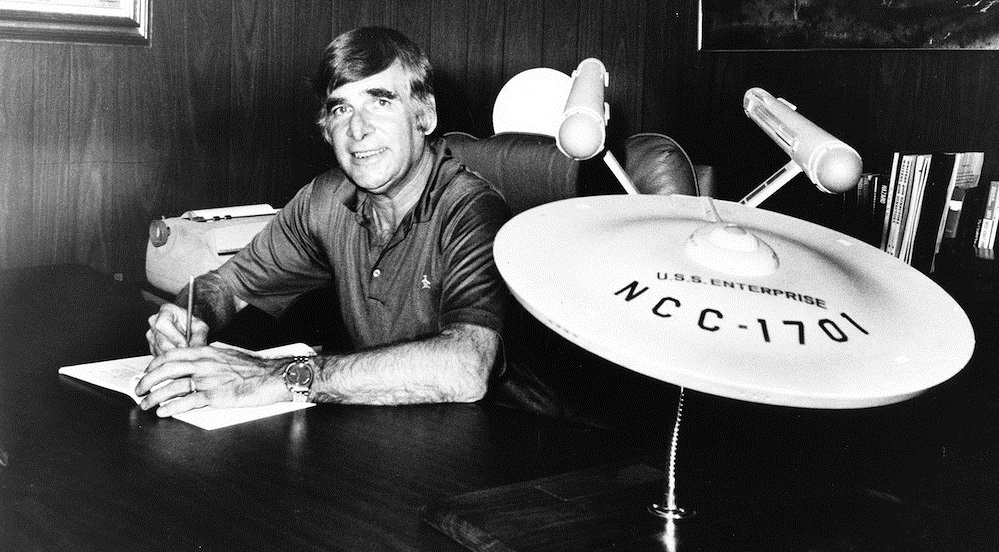

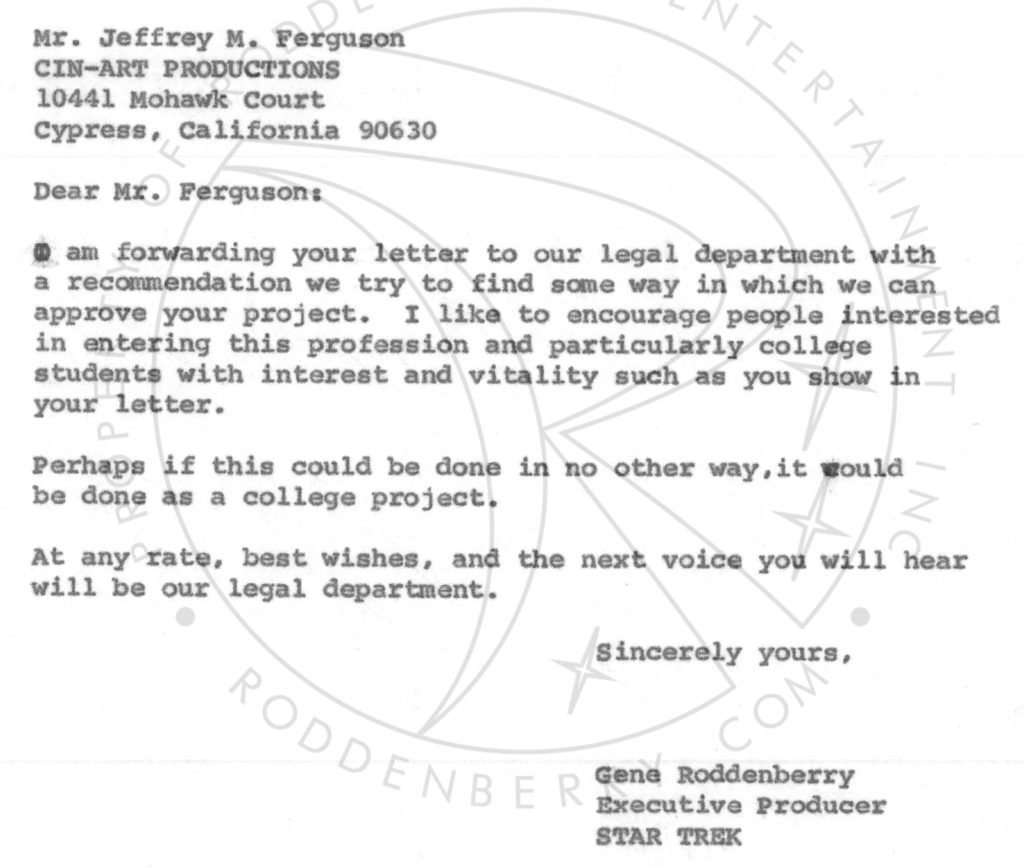
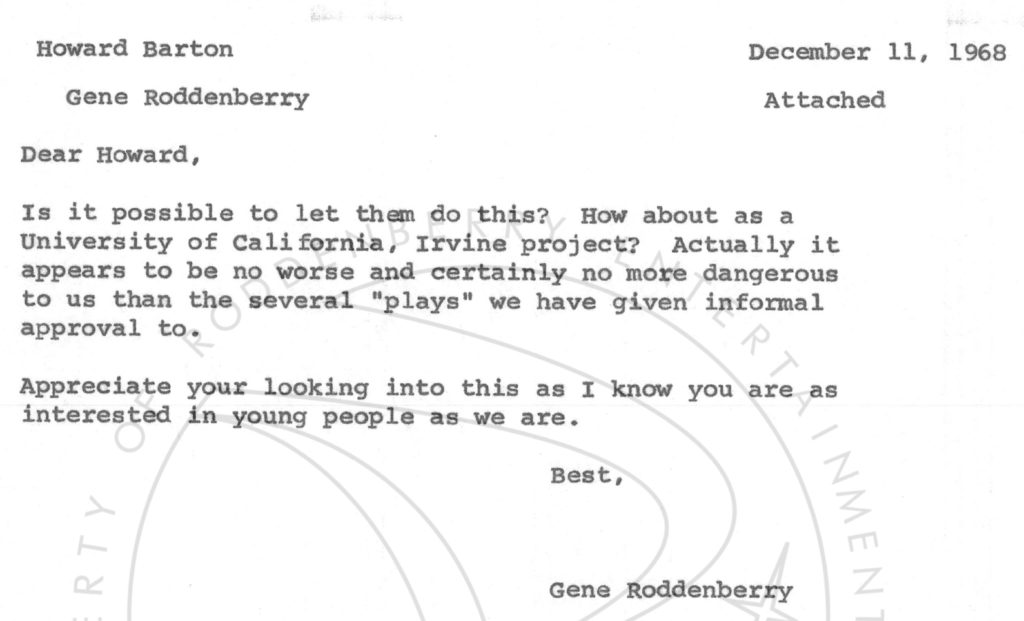
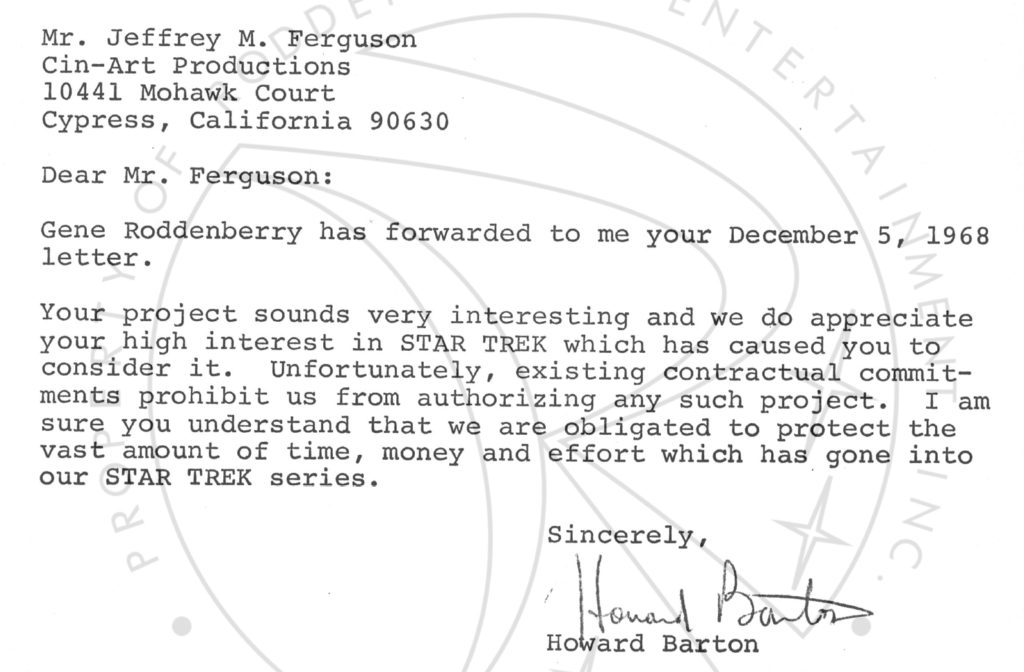

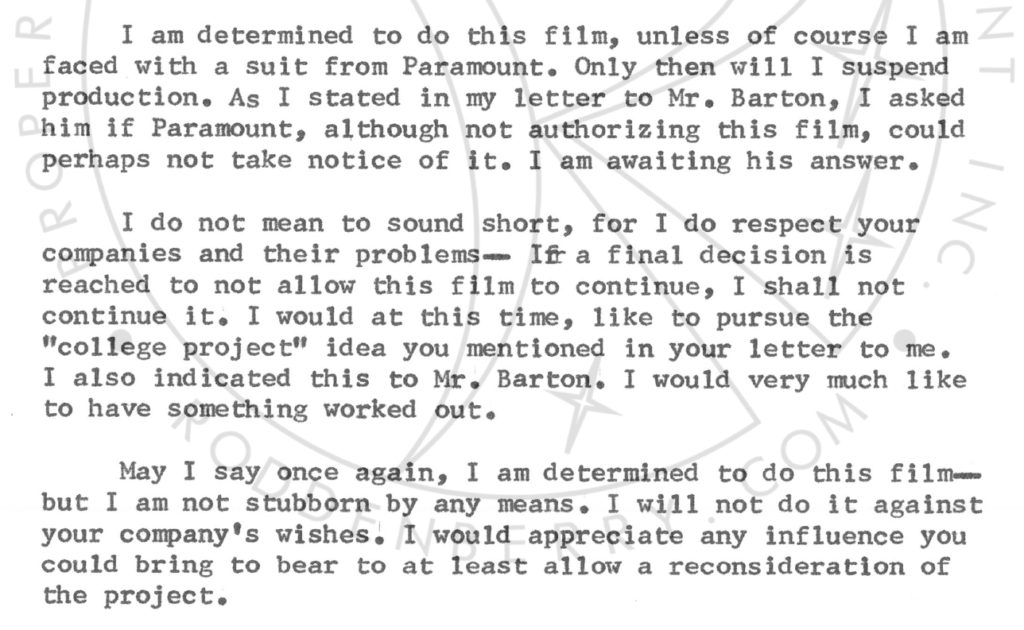
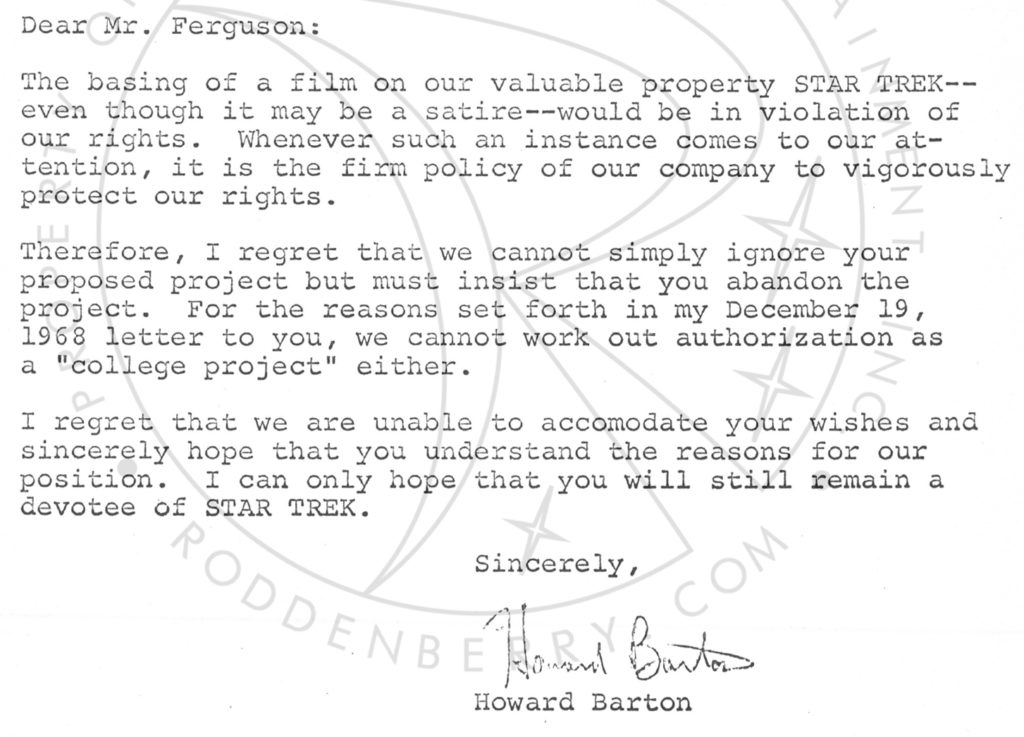
Did Jeffrey Ferguson go on in film production? I’d like to know “The Rest of the Story.”
I looked at IMDb and there were many Jeffrey Fergusons. None seemed to be the correct age. Remember that he was in his early 20s in 1968, so his work in the industry would have started in the 1970s or 80s at the latest.
Jonathan have you tried to see if Mr Ferguson is still around. It might be interesting to read his take 50 years later.
Unfortunately, I have no way of finding the guy. There’s a lot of Jeffrey Fergusons in the world…and even in Hollywood. He’d probably be well into his 70s by now. If anyone out there knows him, tell him to shoot me an e-mail!
Too bad you can’t track him through his postal address.
Dammit, Jim I’m a blogger, not a stalker! 🙂
It would be cool if Jeffrey Ferguson read this blog. He could tell us his plans and maybe another fan project could produce his script.
Wouldn’t THAT be a hoot!
What about contacting UC Irvine or otherwise using that connection to try and track him down? If he graduated, there’s a good chance their alumni association might be able help locate contact information.
Man, you guys are making me WORK!
Have you or Roddenberry Entertainment considered trying to contact Jeffrey Ferguson or Howard Barton(or anyone else who may know more about this situation)? I really would like to see a follow-up to this! 🙂
Everyone wants a follow-up. As it happens, the attorney, Howard Barton, is still alive. Mr. Barton retired in 1992 according to the NY Times, who reported it in a blurb about executive changes in business. Incidentally, the head of network TV at the time was a guy by the name of Pike! But not Christopher…this one was John S.
Oopsie.
I posted before I read the other responses.
I should probably have read the responses, but that makes too much sense and is rational.
No worries Jason. We’re all friends here. 🙂